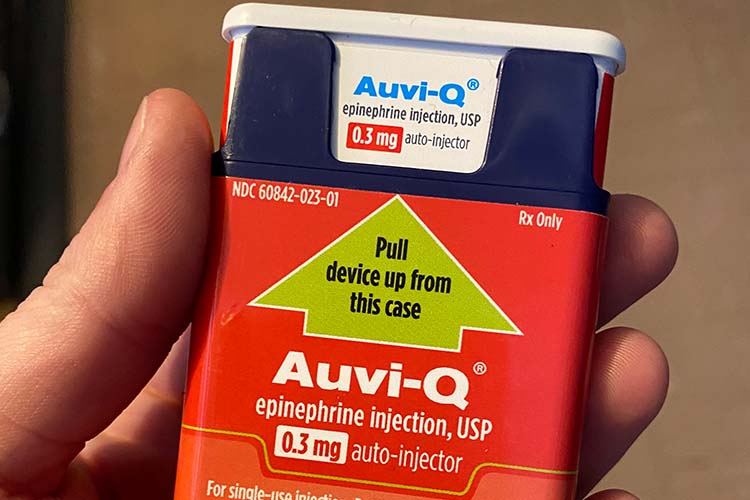
An epinephrine injection used to mitigate asthma attacks or anaphylaxis. photo by Maria Goergen
What are allergies and will there be a cure for them?
More and more people are affected by allergies annually. In 1960, 3% of the population had allergies compared to around 7% in 2018, according to BBC News.
How do allergies work, exactly? Mayo Clinic states, “Allergies occur when your immune system reacts to a foreign substance.” When someone experiences an allergic reaction, the immune system produces antibodies which are protective proteins that respond to foreign substances. Essentially, the body attacks itself because the antibodies identify the allergen as harmful, when it isn’t. This allergic reaction can result in hives and redness of the skin, congested sinuses, and restricted airways (anaphylaxis).
In my personal experience, I always knew that I had allergies from when I was little and I tasted almonds and my face broke out in hives and rashes. Since then, my first interaction with anaphylaxis was in 2nd grade when I ate several cookies containing the very thing I’m allergic to: macadamia nuts. I proceeded to panic, which is exactly what people are told not to do because it makes it more difficult to make critical decisions. At the time, the adults around me told me I was overreacting and that I would be completely fine as my throat proceeded to close. Since then, I have learned the importance of staying calm in stressful situations, and that when I realize I have triggered my allergies, I need to immediately use an Epi-pen and contact my allergist if it gets any worse.
Epipens or Auvi-Q use epinephrine to reverse the effects of anaphylaxis. During anaphylaxis, blood pressure plummets, because blood vessels relax and dilate. Epinephrine reverses this by causing the blood vessels to constrict, ultimately raising the body’s blood pressure, according to Mylan, the maker of EpiPens. Epinephrine or adrenaline is a hormone which is naturally produced through activities such as riding a roller coaster, cliff diving, or watching a scary movie; all of these activities increase heart rate, muscle strength, blood pressure, and metabolism.
Though epinephrine helps reverse the side effects of anaphylaxis, other medical options are coming out for people with allergies such as food oral immunotherapy. The Colorado Allergies and Asthma Centers describes this as a form of immunity caused by eating a small amount of food someone is allergic to for the body to build resistance against it. For example, Mithridates VI of Pontos, also referred to as the “poison king,” consumed small amounts of poison on a regular basis to avoid the fate of his father who died by poison. Ultimately, this led to the “poison king” building an immunity against poison.
I will be involved in a confidential upcoming study through the Colorado Allergies and Asthma centers starting January first. Having personal experience with allergy issues makes me intrigued about why and how they manifest themselves. Hopefully through continued allergy research we can learn more about what causes this and how to prevent it.